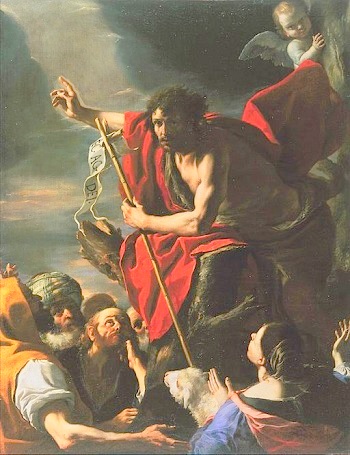
St. John the Baptist Preaching
Mattia Preti, 1665
My dear friends,
On this third Sunday of Advent, the church invites us to reflect on the voice of John the Baptist calling out in the wilderness. His words are as piercing as the cold wind of winter, urging us to prepare our hearts for the coming of the Lord. For both Christians and followers of the Bodhisattva path, this preparation involves a turning inward—a deep repentance and a commitment to live lives of compassion and justice.
coming out to be baptized by him,
"You brood of vipers!
Who warned you to flee from the coming wrath?
Therefore, bear fruits worthy of repentance,
and do not begin to say to yourselves,
'We have Abraham as our ancestor,'
for I tell you, God is able
from these stones to raise up children to Abraham."
- Luke 3:7-8
John’s rebuke reminds us that spiritual lineage or outward signs of religiosity are insufficient without inner transformation. The fruits of repentance are manifested in a life marked by humility, compassion, and selfless service. As John warns against complacency, so too must we examine our own hearts, recognizing that true change comes from an awakening of the mind and heart to the call to love and serve.
therefore every tree that does not bear good fruit
will be cut down and thrown into the fire."
- Luke 3:9
The image of the ax at the root is a sobering one. It speaks of the urgent need to embody the teachings of Christ in daily life -- to uproot self-centered habits and cultivate virtues that benefit all beings through acts of mercy, justice, and generosity.
In reply he said to them,
"Whoever has two coats must share with anyone who has none,
and whoever has food must do likewise."
- Luke 3:10-11
John's practical instructions point us toward a life of active compassion. Sharing our material resources is an act of love and generosity. In a world where inequality abounds, this teaching challenges us to let go of attachment to possessions and instead see the divine in the faces of the poor and the hungry. Such acts of giving prepare the way for Bodhicitta, the mind of Christ, to be born within us.
He said to them, "Collect no more than the amount prescribed for you."
- Luke 3:12-13
The call to ethical living is universal, touching all professions and walks of life. John’s admonition to the tax collectors highlights the need for integrity and fairness in our dealings with others. This teaching reminds us that spiritual growth is not separate from our daily responsibilities but is woven into the fabric of our work and relationships.
He said to them, "Do not extort money from anyone by threats or false accusation,
and be satisfied with your wages."
- Luke 3:14
The soldiers’ question reveals that no one is beyond the scope of divine instruction. John’s response calls for honesty, contentment, and a commitment to non-harm and ethical conduct. Whether in positions of power or humility, we are each responsible for ensuring our actions promote peace and justice rather than exploitation or harm.
whether he might be the Messiah, John answered all of them by saying,
"I baptize you with water, but one who is more powerful than I is coming;
I am not worthy to untie the strap of his sandals.
He will baptize you with the Holy Spirit and fire."
- Luke 3:15-16
John’s humility reminds us that true spiritual leadership points beyond itself to the divine. Baptism with the Holy Spirit signifies the transformative power of Christ’s presence around and within us, reflecting the awakening of bodhicitta, the mind of love and wisdom that burns away ignorance and selfishness.
and to gather the wheat into his granary, but the chaff he will burn with unquenchable fire."
- Luke 3:17
The winnowing imagery symbolizes the divine judgment that separates what is fruitful from what is empty. It is a call to align our lives with spiritual teachings, discerning which thoughts, words, and actions lead to liberation and which perpetuate suffering. The unquenchable fire is not punishment, but rather the purifying presence of spiritual truth, burning away delusions and attachments.
- Luke 3:18
John’s fiery preaching, while challenging, is ultimately good news. It invites us to awaken to a new way of being, grounded in love and justice. His words inspire us to live lives that reflect the light of divine compassion in a world longing for hope and transformation.
As we continue through Advent, may we heed the call of John the Baptist, preparing our hearts to receive the love, compassion and wisdom of Christ. Let us bear the fruits of repentance and embody the divine love that unites all paths of wisdom and compassion.